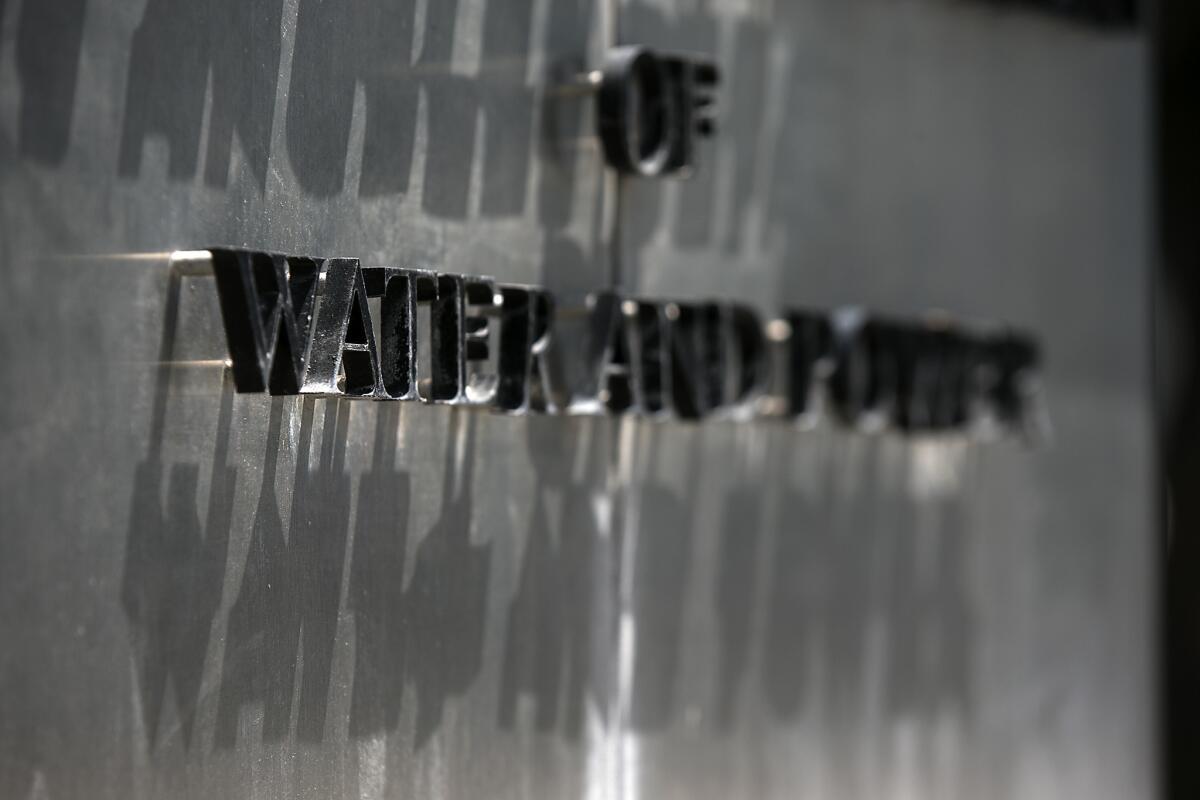DWP watchdog urges changes in hiring rules, union influence at utility

The Los Angeles Department of Water and Power building.
- Share via
In the wake of the botched rollout of a new billing system at the Los Angeles Department of Water and Power that sent inaccurate bills to many customers, a new report by a watchdog agency says the city must make a host of changes to speed up hiring and contracting to prevent similar problems in the future.
The report said a root cause of the billing debacle and its messy aftermath was the sluggish way the agency hires and contracts workers, a problem that city ratepayer advocate and the report’s co-author Fred Pickel attributes to both municipal rules and union agreements.
Resolving those and other problems has been difficult partly because of rapid turnover in the utility’s management, which has skewed the balance of power between management and labor, the report said. The agency can become bogged down in disputes between workers and supervisors when it needs to hire contractors quickly, the report said.
Labor leaders have “veto power on a lot of strategic outsourcing,” Pickel added in an interview.
Problems with hiring and contracting were evident as the DWP grappled with the bungled billing system, according to the report. As the agency tried to handle a massive backlog of erroneous bills, it was
unable to put enough workers in place to quickly respond to customer complaints. Despite extensive efforts to hire and train people faster, customer wait times weren’t under control until nearly a year after the
billing system was launched, the report said.
The utility needed nearly six months to put in place newly trained emergency customer service workers and a year to make permanent hires. Bringing in new billing department staffers took a year and a half.
City and utility leaders should pursue changes that will allow the DWP to hire or contract out for workers within 30 days in “dire and urgent circumstances,” and hire new staff within six months under “normal circumstances,” the report said.
The report also said the DWP needs a backup call center to handle surges in complaints and requests for service. And it recommended changes in how technological projects such as the billing system rollout are managed at the utility.
Many managers are “effectively a ‘lame duck’ from their first day” because of rapid turnover in the top ranks, the report said. It suggested that longer contracts for upper-level managers, along with increased requirements for executive experience, could help slow the revolving door and alter the relationship between management and labor.
Without change, “the imbalance between labor and management” could “materially impede the DWP from moving out of the last century,” the report said.
Marcie Edwards, who took over the utility as general manager last year, said some changes, including steps to create a stronger program management office, were already underway. So did Mayor Eric Garcetti, whose spokesman Jeff Millman said the DWP is transforming into “an organization dedicated to enhancing the customer experience.”
But at a Los Angeles Current Affairs Forum luncheon Wednesday,
Edwards said many of the underlying problems could be tough to remedy.
“About the only way to significantly affect the civil service system
is either by changing the rules … or by virtue of a [city] charter change” that would require voter approval, Edwards said. When asked about the sway of labor at the utility, she said the churn in management had made the union “one of the few constancies.”
As a result, Edwards said, the union “has grown in terms of their control because they’ve been trying to help keep the rudder behind the boat.”
Brian D’Arcy, head of the International Brotherhood of Electrical Workers Local 18, which represents DWP employees, declined to comment on the report.
If the recommended changes can’t be adopted, the report said, the mayor and the City Council should consider more sweeping reforms, including a new system for hiring and alternative governance structures for the agency. Councilman Felipe Fuentes, who oversees a council committee on energy, said he believed the problems at the utility “are bigger than how we hire.”
“This utility is managed, in part, by a board that is appointed by a mayor, that occasionally has to check in with the City Council,” Fuentes said. “It’s difficult to govern in that type of environment.”
The report said the amount of revenue lost because of the billing errors “will not be known for some time.”
Times staff writer Peter Jamison contributed to this report.
Follow @latimesemily for what’s happening at Los Angeles City Hall
More to Read
Sign up for Essential California
The most important California stories and recommendations in your inbox every morning.
You may occasionally receive promotional content from the Los Angeles Times.











